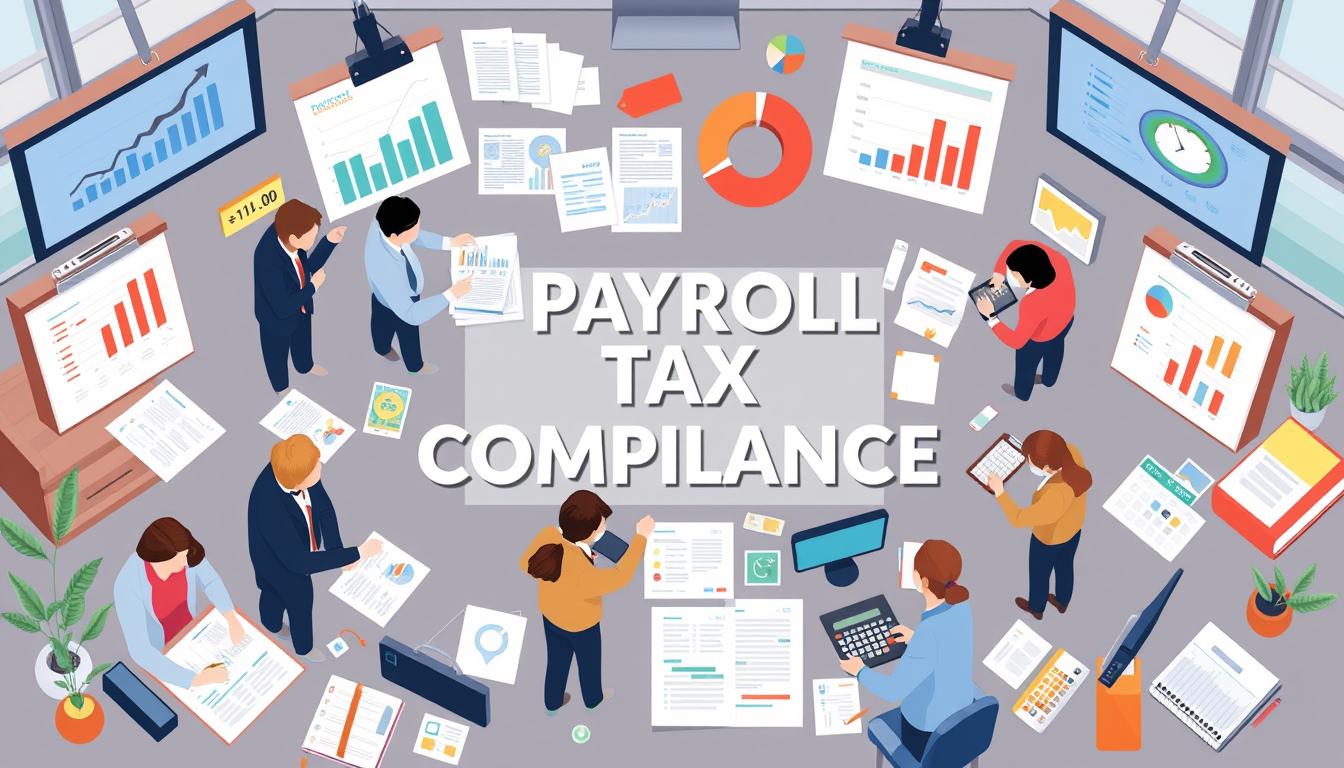As you embark on the journey of tax season each year, the looming deadlines and complex forms can often feel overwhelming. Perhaps you’ve experienced the nagging anxiety of wondering if you’re doing everything right or if you’re missing out on potential refunds. You’re not alone; many individuals face these similar feelings when it comes to income tax preparation. Navigating the intricate landscape of income tax can be daunting, but it’s essential to realize that you’re taking responsibility not just for your finances but for contributing to the community as a whole. Each penny you’re taxed plays a significant role in funding vital services and infrastructure that benefit us all. In this guide, we’ll immerse ourselves in the essentials of tax filing, explore the significance of tax deductions and credits, and empower you with insights to make your tax experience as smooth as possible.
By the end of our exploration together, you’ll be equipped with knowledge that demystifies these processes and positions you toward smarter financial decisions, ultimately aiding in your peace of mind during tax season and beyond12.
Key Takeaways
- Understanding the basics of income tax is crucial for effective tax filing.
- Being aware of key deadlines can help avoid last-minute stress.
- Filing your tax returns is a legal requirement for professionals and businesses alike.
- Maximizing your tax deductions can significantly impact your taxable income.
- Proper tax planning is vital for financial success and compliance with IRS regulations.
- Knowing the potential for tax credits can lead to substantial savings.
- Accurate record-keeping supports better financial management and future planning.
Understanding Income Tax Basics
Income tax is a crucial component of financial management that affects individuals and businesses alike. It represents an annual obligation to report income earned and taxes owed to the government. As you navigate through the various types of income tax, it becomes essential to understand why you are required to make these payments.
What is Income Tax?
Income tax is a tax levied on the income of individuals and businesses. Primarily, it encompasses federal, state, and local taxes that fund a broad array of public services. The federal income tax system utilizes a progressive model, meaning higher earners pay a larger percentage of their income in taxes, which helps to redistribute wealth across various societal classes3. Conversely, regressive taxes, such as sales tax, impose the same percentage regardless of income level, often placing a heavier burden on lower-income individuals3. It’s essential for taxpayers to remain compliant with these regulations to avoid penalties.
Why You Pay Income Tax
Your payment of income tax serves multiple purposes. These funds are critical in supporting national defense, education, healthcare, and social programs3. For those living in states like Texas, it’s important to note that while there is no state income tax, you are still liable for federal income taxes4. Additionally, if you are an international student, compliance is mandatory, as international tax obligations can have significant repercussions on your immigration status4.
Different Types of Income Tax
Understanding the various types of income tax can help in managing your overall financial strategy. Below is a summary of key categories of taxation:
| Type of Income Tax | Description |
|---|---|
| Federal Income Tax | Taxes on income earned that contribute to the federal budget for essential services. |
| State Income Tax | Varies by state; used to fund state programs like education and infrastructure. |
| Local Income Tax | Taxes imposed by local municipalities for community services. |
| Payroll Tax | Shared between employers and employees, often funding Social Security and Medicare3. |
| Property Tax | Tax levied on real estate and other property assets. |
| Sales Tax | A consumption tax based on a percentage of retail price, can disproportionately impact lower-income earners. |
| Estate Tax | Tax on estates exceeding a certain value, affecting fewer individuals each year3. |
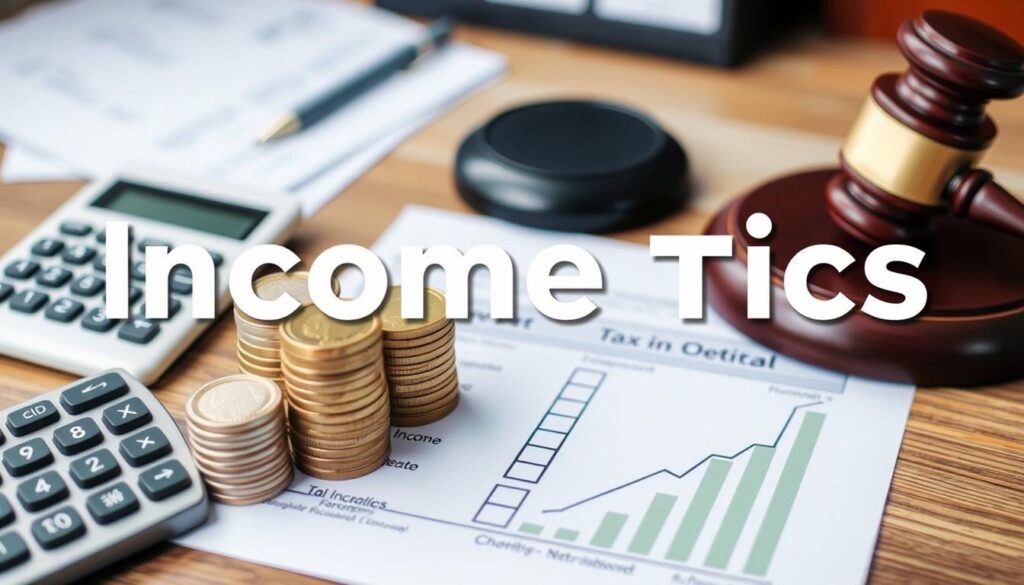
Being informed about these different types allows for better tax compliance and effective financial planning3.
Key Dates on the Tax Calendar
Staying on top of tax deadlines is crucial for effective financial management. Knowing the key dates for federal tax filing and state tax deadlines can help you avoid unnecessary penalties. Below is a breakdown of essential dates to keep in mind as you navigate your tax calendar.
Federal Tax Deadline
The federal tax deadline for individuals is typically April 15 each year. If you need extra time to prepare your tax return, you can file for an automatic six-month extension using Form 7004. Remember, payments due by this date cover any taxes owed for the prior year and the first installment of estimated taxes for the current year must also be made on April 155. Keep in mind that if you filed a six-month extension for your information return, the new deadline is November 156.
State Tax Deadlines
Each state has its own tax deadlines that can vary significantly. Many states align their deadlines with federal dates, but it’s essential to check your state’s tax calendar. Some states may require different forms or have unique deadlines for specific types of entities, such as corporations or partnerships.
Important Milestones
Here are some critical milestones throughout the tax year to consider:
| Date | Event |
|---|---|
| January 31 | Employers must provide Form W-2 to employees for 2024 |
| April 10 | Sole proprietors must report tip income of $20 or more to employers for the month of March |
| June 16 | Deadline for U.S. citizens abroad to file 2024 income tax returns |
| October 15 | Final deadline for taxpayers with extensions to file 2024 income tax returns |
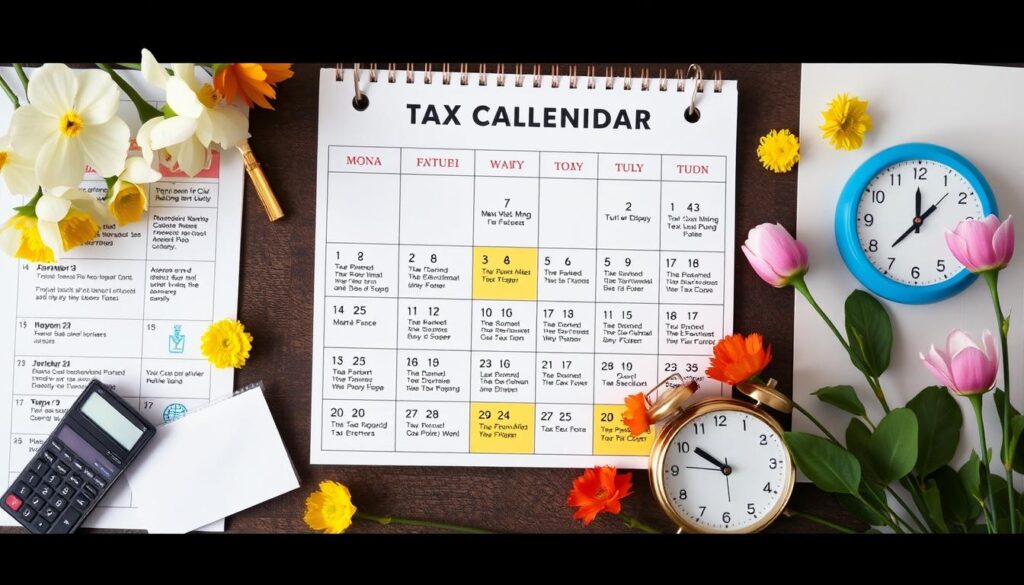
Being aware of these important dates can help you better manage your tax obligations and avoid penalties associated with missed deadlines. Don’t hesitate to consult a tax professional if you have questions related to your specific circumstances65.
Filing Your Income Tax Returns
When it’s time to file your tax return, understanding the various options available to you is essential. Choosing the right filing method can save you time and stress. The IRS offers several avenues for filing, including traditional paper submissions and modern e-filing. With e-filing, taxpayers often enjoy quicker refunds and simplified processes. Many filers with adjusted gross income of $79,000 or less can electronically file for free using IRS Free File7.
Choosing the Right Filing Method
Selecting the appropriate filing method depends on your financial situation and comfort level with technology. If your tax situation is uncomplicated, you might prefer e-filing, which allows for rapid processing. Alternatively, if you find tax forms overwhelming, hiring a professional tax preparer can ensure accuracy and compliance. Tax return preparers, including enrolled agents and certified public accountants, should be skilled in navigating the complexities of tax preparation8. Utilizing the IRS’s Interactive Tax Assistant can help you determine eligibility for various credits and deductions8.
Common Tax Forms Explained
Being familiar with the common tax forms can significantly ease the filing process. The Form 1040 is the primary document for individual income tax returns, while Form W-2 reports wages and taxes withheld for employees. Freelancers and independent contractors typically use Form 1099 to report their income. For those looking for assistance, the VITA Locator Tool can help find open sites to receive free basic tax return preparation through the IRS Volunteer Income Tax Assistance program8.
Where to File Your Return
You can file your return through several platforms. The IRS website offers options for e-filing directly, which is particularly convenient8. Additionally, taxpayers can utilize various reputable tax software programs that streamline the filing process. For those who prefer in-person service, professional preparers listed in the Directory of Federal Tax Return Preparers will provide expert assistance8. Remember that failure to file by the deadline, which is Monday, April 15, 2024, can lead to penalties, making timely submission critical7.

Tax Deductions You Should Know
Understanding tax deductions is essential for optimizing your tax savings. The distinction between standard deductions and itemized deductions can significantly impact your overall tax bill. This section provides insights into common deductions for individuals and self-employed taxpayers, ensuring you don’t miss out on potential tax savings.
Standard vs. Itemized Deductions
You can choose between taking the standard deduction and itemizing your deductions on your tax return. For the tax year 2024, the standard deduction amounts are:
| Filing Status | Standard Deduction 2024 |
|---|---|
| Single | $14,600 |
| Married Filing Jointly | $29,200 |
| Married Filing Separately | $14,600 |
| Head of Household | $21,900 |
| Surviving Spouses | $29,200 |
Itemized deductions include various eligible expenses like mortgage interest, property taxes, and medical expenses exceeding 7.5% of your adjusted gross income (AGI)9. Knowing which option is better for you can lead to significant tax savings each year.
Common Deductions for Individuals
Taxpayers often overlook several deductions, which can result in missed savings. Some common deductions include:
- Mortgage Interest: This can substantially reduce your taxable income.
- Charitable Donations: You can deduct qualified contributions, limiting up to $300 for individuals or $600 for married couples filing jointly9.
- Medical Expenses: Deductible amounts begin after costs exceed 7.5% of your AGI9.
- Property Taxes: The state and local taxes (SALT deduction) are capped at $10,000, with half the amount for married filing separately9.
Deductions for Self-Employed
Self-employed individuals can take advantage of unique deductions to lower their taxable income effectively. These include:
- Home Office Deduction: Deduct a portion of home expenses if your home is your business location.
- Health Insurance Premiums: These can be deducted to lower your taxable income.
- Retirement Contributions: You can deduct contributions to retirement plans like a SEP IRA, benefiting your tax strategy.
- Business Expenses: Ordinary and necessary expenses incurred for your trade can be deducted, including equipment and supplies.
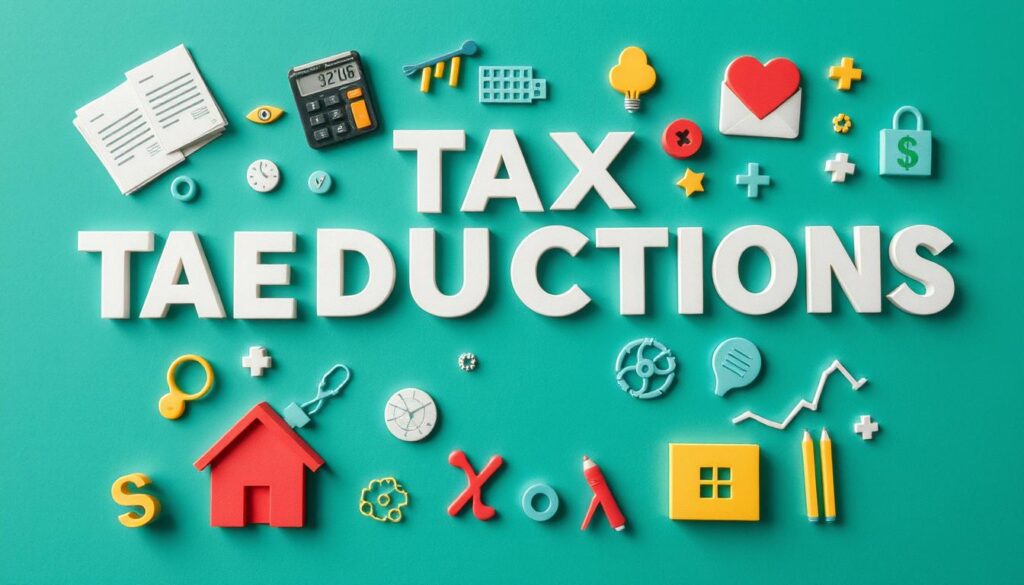
Maximizing these tax deductions is crucial in the pursuit of tax savings. By understanding how standard and itemized deductions work together, you can better position yourself to benefit from available tax breaks1011.
Tax Credits: Maximizing Savings
Tax credits serve as direct reductions of your overall tax liability, presenting a unique opportunity for maximizing savings. Unlike deductions, which lower your taxable income, tax credits provide a dollar-for-dollar reduction in the taxes you owe, making them particularly valuable during tax season.
What Are Tax Credits?
Tax credits are financial benefits that can be claimed on your tax return to decrease your tax liability. They come in various forms and can significantly aid taxpayers in reducing the amount due to the government.
Popular Tax Credits Available
Several popular tax credits can help you save money, such as:
- Earned Income Tax Credit (EITC): Aimed at low- or moderate-income individuals and families, this credit can boost your refund based on your earnings and number of children.
- Child Tax Credit: For families with children under 17, this credit can provide up to $2,000 per qualifying child in 2024, enhancing your financial situation.
- Small Business Health Insurance Premiums Credit: Small businesses with fewer than 25 employees may qualify for a credit covering 50% of employee premium costs.
- Premium Tax Credit: You might be eligible for this credit if you purchase health insurance through the marketplace, helping to make coverage more affordable.
- Work Opportunity Credit: This credit incentivizes employers to hire individuals facing significant barriers to employment.
How to Claim Your Tax Credits
Claiming credits involves a few manageable steps:
- Identify the tax credits you qualify for during tax preparation.
- Ensure that all necessary documentation is available, such as income statements and other supporting paperwork.
- Complete the appropriate forms accurately, ensuring compliance with eligibility criteria.

Being aware of these popular tax credits can significantly impact your financial well-being. When you strategically focus on claiming credits, you enhance your potential for maximizing savings while navigating the complexities of tax obligations. Staying informed about various credits ensures that you are prepared to reduce any impending tax situations effectively1213.
Understanding Tax Brackets
Tax brackets play a crucial role in how much you owe in taxes. These brackets categorize your income levels and determine the rate at which you are taxed. For tax year 2025, the United States has seven federal tax brackets, with tax rates ranging from 10% to 37%14. The tax brackets established by the Tax Cuts and Jobs Act of 2017 are adjusted annually for inflation using the Consumer Price Index (CPI)14.
What Are Tax Brackets?
In a progressive tax system, individuals with lower incomes are taxed at lower rates while those with higher incomes face higher rates14. Understanding these brackets helps you navigate your tax planning more effectively. For 2025, the thresholds range from 10% for single filers earning up to $11,925, to 37% for income exceeding $626,35014.
How They Affect Your Tax Bill
Your position within these tax brackets has a direct tax bill impact. For example, if you have a taxable income of $50,000, your effective tax rate would be approximately 13%14. This means you end up paying a lower rate overall while still benefiting from higher contributions to your retirement accounts or tax credits such as the Child Tax Credit14.
Strategies to Manage Your Tax Bracket
Engaging in smart tax planning can keep you in a lower tax bracket. By utilizing deductions and credits, you can effectively manage your taxable income to stay below certain income thresholds14. Additionally, being informed about the different state income tax brackets is essential, as they can significantly vary15.
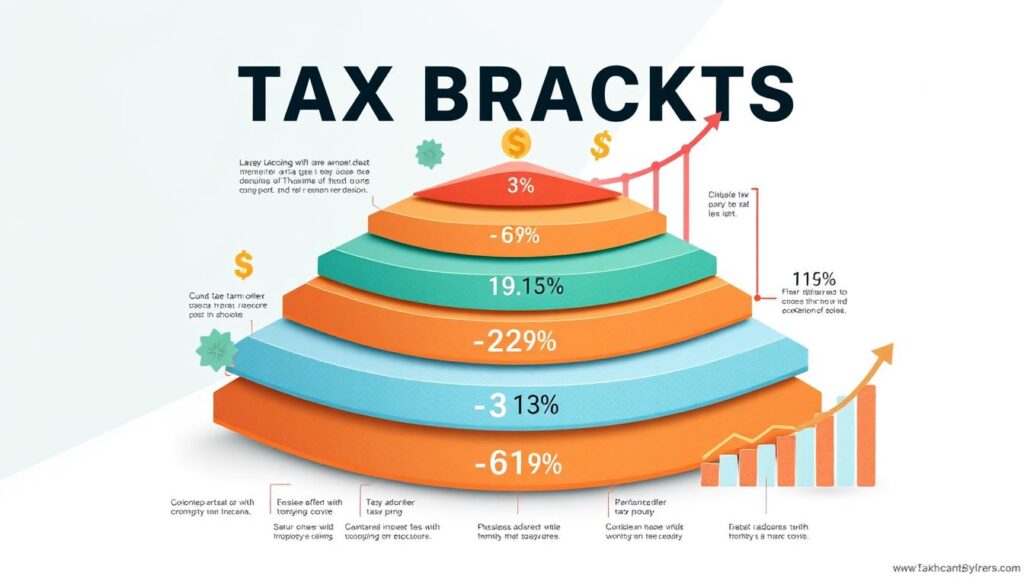
| Filing Status | Income Range | Tax Rate |
|---|---|---|
| Single | $0 – $11,925 | 10% |
| Single | $11,926 – $50,000 | 12% |
| Single | $50,001 – $626,350 | Highest rate at 37% |
| Married Filing Jointly | $0 – $23,850 | 10% |
| Married Filing Jointly | $23,851 – $100,000 | 12% |
| Married Filing Jointly | $100,001 – $751,600 | Highest rate at 37% |
Knowing the specifics of tax brackets is not just beneficial—it is essential for effective tax planning. Whether you are a single filer or married, understanding income brackets could lead to significant savings and improved financial health14.
Common Mistakes to Avoid
Understanding common tax mistakes can significantly enhance your filing experience. Many taxpayers encounter challenges due to errors in record keeping, miscalculating deductions and credits, or missing deadlines. Being aware of these issues is essential for a smooth tax season.
Errors in Record Keeping
One of the most frequent tax mistakes arises from poor record keeping. Accurate records contribute substantially to preventing filing errors. Tax software helps to avoid common errors and prompts for missing information, leading to more accurate tax returns16. Additionally, using reputable tax preparers like certified public accountants can assist you in minimizing mistakes17. Always ensure that double-checking is part of your routine when reviewing documents for accuracy.
Miscalculating Deductions and Credits
Miscalculating deductions and credits can have severe consequences. Errors can stem from simple mathematical mistakes to more intricate calculations. The IRS has identified a high prevalence of math errors, with nearly 2.5 million such errors found on returns filed for the 2017 tax year18. Tax software can automatically check these calculations and guide you on the necessary forms and schedules to avoid any oversight17. Verifying information such as wages, dividends, and other income is crucial for accuracy.
Missing Deadlines
Missing deadlines can lead to penalties and complications with the IRS. Filing too early without receiving all necessary reporting documents can increase your chances of errors17. Furthermore, an incorrect filing status often leads to tax mistakes that could impact your overall tax efficiency18. Remember, the fastest way to receive a refund is through direct deposit, but ensure you provide the correct bank account numbers on your tax return to avoid complications16.

The Importance of Tax Planning
Understanding the significance of tax planning can lead to improved financial health and reduced stress when tax season arrives. Tax planning involves making informed decisions throughout the year to minimize your tax liabilities and maximize tax benefits. By employing proactive tax strategies, you can optimize deductions and credits, paving the way for potential savings that can range from hundreds to thousands of dollars, depending on your individual situation19.
What is Tax Planning?
Tax planning is the process of assessing your financial situation and making decisions to ensure your tax liabilities are as low as possible. This includes understanding potential tax obligations, structuring your business effectively, and keeping good records to optimize available deductions and credits20. Meeting with a financial consultant early in the year can provide guidance and set the stage for effective tax management21.
Benefits of Planning Ahead
Planning ahead allows you to strategically time your income and expenses, ultimately leading to maximized tax benefits. Accurate financial record-keeping becomes crucial in this process to identify opportunities for deductions and credits21. Tax planning saves time by simplifying tax filing and minimizes the need for last-minute scrambling for documents20. With proper planning, funds that would have gone to taxes can instead be reinvested in your business or personal endeavors.
Strategies for Effective Tax Planning
- Utilize tax-advantaged accounts such as IRAs and HSAs to manage taxable income.
- Take advantage of available tax credits and deductions to reduce your overall tax liability.
- Engage with a financial consultant throughout the year to stay informed of changes in tax laws and optimize your financial strategies20.
- Invest in reliable bookkeeping software to maintain organized financial records, enhancing your ability to identify tax-saving opportunities19.

Successful tax planning not only decreases your burden during tax season but also empowers you to make better long-term financial decisions21. By understanding and participating in effective tax planning, you position yourself to overcome existing tax challenges and secure financial comfort in your future.
“Tax planning is key to making the most out of your financial resources.”19
Dealing with Audits
Facing a tax audit can be daunting, but knowing what triggers an audit, how to prepare for it, and essential survival tips can make the process smoother. Understanding various audit triggers is crucial for audit preparation when dealing with the IRS.
What Triggers an Audit?
Many audits occur due to objective statistical reviews of filed returns, with over 95% attributed to this method22. Factors such as reporting substantial deductions or failing to report all items of income can increase the likelihood of an audit. For instance, returns with very large gross incomes and high deductions relative to gross business income, especially Schedule Cs, attract more scrutiny22.
How to Prepare for an Audit
To effectively ready yourself for a tax audit, gather all relevant documents such as tax returns, receipts, and financial statements. The IRS typically reviews returns submitted within the last three years, extending up to six years for significant errors23. Ensure all records are accurate, as any inaccuracies can lead to costly civil penalties and possible criminal investigations22.
Tips for Surviving an Audit
During the audit process, know your rights, including professional treatment and privacy, as well as understanding IRS requests. Representation by a CPA, attorney, or IRS Enrolled Agent is advisable, even if it can be an expensive endeavor22. The duration of an audit may fluctuate based on its type and complexity, so stay organized and prepared for any issues that may arise23.

Filing for Extensions
If you find that you cannot meet the regular tax filing deadlines, filing for a tax extension can provide you the extra time you need to prepare your returns. Understanding when and how to file for an extension is crucial. Here we break down the process, offering guidance on what happens next.
When to File for an Extension
Taxpayers can file for a tax extension until the original filing deadline. U.S. citizens and resident taxpayers who are out of the country by the regular due date automatically receive an additional two months to file, even without a formal extension request24. For corporations and partnerships, the extensions must be filed by specific deadlines:
| Entity Type | Filing Deadline for Extensions |
|---|---|
| C Corporations | 15th day of the fourth month after the end of the tax year |
| S Corporations | 15th day of the third month after the end of the tax year |
| Partnerships | 15th day of the third month after the end of the tax year |
How to File an Extension
To file for an extension, you can use Form 4868 for individuals or the appropriate forms for businesses, which can include various tax-related forms for exempt organizations or retirement plans25. Filing can often be done online through the IRS website, and it’s important to ensure you submit the necessary documentation correctly to avoid any issues. Many tax preparation software options offer streamlined processes for filing extensions, often with lower costs than other competitors26.
What Happens After Filing for an Extension?
Once you file for an IRS extension, it’s important to remember that while you are granted additional time to file your return, payment of any taxes owed is still due by the original deadline. Failure to pay by the due date may result in penalties and interest on the unpaid amount, which can accrue until your tax is fully paid24. Be mindful of the potential 25% failure-to-file penalty per month if your payment is late24. Understanding these implications ensures you stay prepared and compliant.

Changes in Tax Law
Staying on top of tax law changes is crucial for effective financial planning and compliance. Recent revisions in tax legislation can significantly impact your tax obligations. Understanding these changes helps you navigate the evolving tax landscape more effectively.
Recent Tax Law Changes You Should Know
The IRS has implemented various tax law changes aimed at improving taxpayer experience and compliance. For the upcoming tax year 2025, the standard deduction for single taxpayers will be $15,000, which represents a $500 increase from 202427. Married couples filing jointly can expect a standard deduction of $30,000, an increase of $800 from the previous year27. Furthermore, the earned income tax credit for taxpayers with three or more children will rise to a maximum of $8,046, up from $7,830 in 202427. The IRS provided penalty relief to approximately 4.7 million individuals and businesses, totaling around $1 billion, primarily benefitting those earning less than $400,000 annually28.
How Changes Affect You
Changes in tax legislation directly influence your filing process and available deductions or credits. With the establishment of electric vehicle credits and home energy credits under the Inflation Reduction Act, taxpayers investing in energy-efficient improvements could benefit significantly28. Additionally, the IRS has modified rules for claiming alternative fuel credits, allowing for one-time claims, which provides new opportunities for savings28.
Staying Informed on Future Changes
Given the frequent updates to tax laws, staying informed about IRS updates is vital. Subscribing to IRS alerts and following reputable financial news outlets can help you learn about these changes promptly. Planning for these adjustments ahead of time will facilitate a smoother tax filing experience.

Resources for Tax Help
Accessing the right tax resources can significantly simplify the process of preparing your tax returns. You have many options for obtaining professional tax help tailored to your needs, whether you prefer personal assistance or online tools.
Where to Find Professional Assistance
For personalized guidance, consider utilizing the Volunteer Income Tax Assistance (VITA) program, which has been operating for over 50 years and assists individuals earning $67,000 or less annually29. The Tax Counseling for the Elderly (TCE) program is designed specifically for those aged 60 and older29. Many VITA and TCE sites are staffed by IRS-certified volunteers who undergo extensive training in tax law29. Tens of thousands of these volunteers prepare millions of federal and state tax returns each filing season29. To locate a VITA or TCE site near you, use the VITA Locator Tool or call 800-906-988729.
Online Tools and Calculators
Numerous online tools and calculators are available, offering a convenient way to handle tax preparation. Electronic filing is considered the easiest and most accurate method for submitting your tax returns30. Free resources like VITA and TCE programs highlight opportunities to receive professional help without cost. Certain sites even allow you to prepare your own basic federal and state tax return for free using web-based software, with support from IRS-certified volunteers29.
Government Resources Available
The IRS provides a wealth of resources for taxpayers. Low Income Taxpayer Clinics (LITCs) offer free assistance for taxpayers looking to resolve disputes with the IRS30. Directories exist that help you find qualified paid tax professionals based on credentials and location. It’s crucial to choose a tax professional wisely; various categories of paid tax professionals are available, each with differing levels of expertise30. Resources are also offered to assist in finding non-profit professional associations that can connect you with suitable tax help30.

Final Thoughts on Income Tax
As you navigate the complexities of income tax, it’s crucial to adopt a proactive approach towards managing your financial responsibilities. A positive tax attitude encourages you to stay informed about changes in tax legislation and develop tax awareness, which can ultimately lead to more favorable outcomes. By being diligent, you can mitigate potential issues before they arise, allowing for informed decisions that positively impact your financial situation.
Being Proactive About Your Taxes
Staying updated about the latest amendments to tax laws—including discussions like the Supreme Court’s review of the “mandatory repatriation tax” under the 2017 Tax Cuts and Jobs Act—ensures that you can adjust your strategies accordingly. Approximately 153.8 million tax returns were filed in 2022, with taxpayers reporting nearly $14.8 trillion in adjusted gross income, which emphasizes the enormity of the tax landscape and the importance of understanding your individual position within it3132.
Keeping Up with Tax Changes
Being aware of legislative shifts, such as President Biden’s proposed tax on unrealized appreciation for affluent Americans, is vital for maintaining an effective tax plan. The complexity of tax codes, which have evolved through thousands of pages of regulations, makes it imperative for you to have strong tax awareness and stay engaged with reliable resources that provide timely updates.
Understanding Your Financial Responsibilities
Ultimately, grasping your financial responsibilities involves knowing how your actions influence your tax obligations. Understanding the nuances of income taxes and leveraging your tax rights can promote a healthier financial outlook. As income tax laws continue to evolve, being informed and proactive will help you navigate your tax duties with confidence and clarity3132.
FAQ
What is income tax and why is it important?
What are the key deadlines I need to remember for tax filing?
How should I file my tax return?
What is the difference between standard and itemized deductions?
What are tax credits, and how do they work?
How do tax brackets affect my income taxes?
What common mistakes should I avoid during tax preparation?
What is the importance of tax planning?
What triggers an IRS audit?
How do I file for a tax extension?
How do changes in tax law impact my obligations?
Where can I find professional help for my taxes?
Source Links
- https://www.linkedin.com/pulse/navigating-income-tax-returns-essential-insights-new-sharma-tivnc – Navigating Income Tax Returns: Essential Insights for New Professionals
- https://www.robinwaite.com/blog/navigating-business-taxes-essential-insights-for-small-enterprises – Navigating Business Taxes: Essential Insights
- https://files.consumerfinance.gov/f/documents/cfpb_building_block_activities_taxes-understanding-basics_handout.pdf – Taxes: Understanding the basics
- https://global.tamu.edu/isss/resources/taxes/basics – Income Tax Basics – Global Engagement
- https://www.sage.com/en-us/blog/tax-due-date/ – Tax due dates & deadlines for 2025
- https://bradyware.com/tax-calendar/ – Tax Calendar
- https://www.irs.gov/filing/individuals/how-to-file – File your return | Internal Revenue Service
- https://www.irs.gov/individuals/get-ready-to-file-your-taxes – Get ready to file your taxes
- https://www.investopedia.com/articles/tax/09/overlooked-tax-deductions.asp – 5 Most Overlooked Tax Deductions
- https://www.nerdwallet.com/article/taxes/tax-deductions-tax-breaks – 22 Popular Tax Deductions and Tax Breaks – NerdWallet
- https://turbotax.intuit.com/tax-tips/tax-deductions-and-credits/tax-deductions-2020-what-will-sunset-or-change/L7gdLfrub – Tax Deductions 2024: What’s New or Changed
- https://www.irs.gov/credits-and-deductions-for-individuals – Credits and deductions for individuals
- https://1800accountant.com/blog/maximize-small-business-tax-deductions – 7 Tips to Maximize Deductions and Credits in 2024 | 1-800Accountant
- https://www.investopedia.com/terms/t/taxbracket.asp – 2025 Tax Brackets and Federal Income Tax Rates
- https://taxfoundation.org/taxedu/glossary/tax-brackets/ – What are Tax Brackets?
- https://www.irs.gov/newsroom/common-tax-return-mistakes-that-can-cost-taxpayers – Common tax return mistakes that can cost taxpayers
- https://www.irs.gov/newsroom/taxpayers-should-avoid-these-common-mistakes-when-they-file-their-tax-return – Taxpayers should avoid these common mistakes when they file their tax return
- https://turbotax.intuit.com/tax-tips/irs-tax-return/common-mistakes-when-filing-taxes-that-are-easy-to-avoid/L4WkkAiCT – 6 Common Mistakes When Filing Taxes That are Easy to Avoid
- https://www.bctax.com/blog/the-importance-of-tax-planning/ – Is Tax Planning Worth It? Why Is Tax Planning Important?
- https://deleonandstang.com/insights/tax-planning-importance – Why Tax Planning Is Important — DeLeon & Stang
- https://landmarkcu.com/invest/investment-articles/early-tax-planning-benefits/ – 5 Benefits of Early Tax Planning
- https://www.cobar.org/For-the-Public/Legal-Brochures/How-To-Deal-With-And-Survive-IRS-Income-Tax-Audits – How To Deal With (And Survive) I.R.S. Income Tax Audits
- https://www.irs.gov/businesses/small-businesses-self-employed/irs-audits – IRS audits | Internal Revenue Service
- https://www.investopedia.com/terms/f/filing-extension.asp – Filing Extension: What It Is and How It Works
- https://www.irs.gov/filing/get-an-extension-to-file-your-tax-return – Get an extension to file your tax return
- https://www.taxact.com/file-irs-tax-extension – Free Tax Extension | File an IRS Tax Extension | TaxAct
- https://www.irs.gov/newsroom/irs-releases-tax-inflation-adjustments-for-tax-year-2025 – IRS releases tax inflation adjustments for tax year 2025
- https://www.irs.gov/newsroom/tax-updates-and-news-from-the-irs – Tax updates and news from the IRS
- https://www.irs.gov/individuals/free-tax-return-preparation-for-qualifying-taxpayers – Free tax return preparation for qualifying taxpayers
- https://www.irs.gov/newsroom/resources-to-help-you-prepare-your-tax-return-and-resolve-tax-disputes – Resources to Help You Prepare Your Tax Return and Resolve Tax Disputes
- https://www.chicagobooth.edu/review/its-time-us-abolished-income-tax – It’s Time the US Abolished the Income Tax
- https://taxfoundation.org/data/all/federal/latest-federal-income-tax-data-2025/ – Summary of the Latest Federal Income Tax Data, 2025 Update

